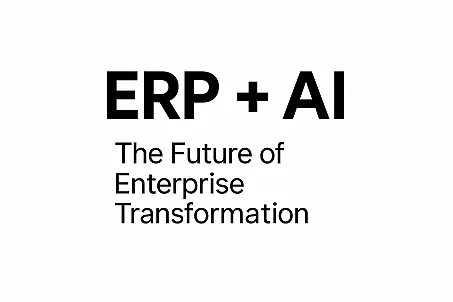🌐 The Myth: “ERPs will die.”
You’ve probably heard the claim: “ERPs are dinosaurs. They’ll slowly die.”
But here’s the reality - ERPs are not fading, they are evolving. In fact, the most successful organizations are proving that ERP + AI is the winning formula.
ERP is no longer just a data repository. It is the operational backbone that runs finance, supply chain, HR, and compliance. With AI layered on top, it becomes smarter, faster, and future-proof.
⚡ Why AI Adoption Matters
AI is no longer hype - it is execution. Organizations that adopt AI effectively are seeing:
-
Accelerated innovation by shortening the path from data to decision.
-
Enhanced efficiency with predictive insights that anticipate disruptions.
-
Stronger customer and employee experiences through intelligent automation.
-
Resilient operations that adapt faster to volatile markets.
AI in the enterprise is not about shiny demos. It is about embedding intelligence into the everyday processes that keep companies running.
🤖 AI in Action (IFS Cloud)
IFS Cloud demonstrates how ERP and AI intersect in practice. Its embedded AI capabilities are not side features - they are integral to daily execution:
-
Smarter forecasting that sharpens demand and supply planning.
-
Anomaly detection across finance and supply chain, surfacing risks early.
-
Intelligent workflows that reduce manual approvals and accelerate compliance.
-
Automation that eliminates repetitive tasks in service, manufacturing, and logistics.
These are not futuristic concepts. They are operational advantages available today.
⚔️ The ERP + AI Debate
The ERP conversation often gets framed as a clash: ERP vs. AI. But this is a false dichotomy. The real story looks more like this:
-
ERP = Stability & Compliance
-
AI = Speed & Intelligence
-
Together = The Winning Formula
When reframed this way, the debate shifts from fear of obsolescence to recognition of opportunity. ERP and AI are not competitors - they are complementary forces.
🔗 Partnerships That Prove Scale
Strategic partnerships and acquisitions signal how seriously vendors are investing in this future. A clear example is IFS acquiring 7bridges.
Why does this matter?
-
Scale: 7bridges brings AI-driven supply chain precision designed for speed and resilience.
-
Relevance: The impact is immediate for asset-intensive industries where agility is critical.
-
Momentum: The move builds on earlier steps like TheLoops and Nexus Black, underlining IFS’s AI-first ERP strategy.
Partnerships like these resonate because they blend strategic vision with tangible innovation. They show that ERP is not static - it is expanding through ecosystems.
🧭 Governance as Strategy
AI without governance is risky. ERP without governance is incomplete. Together, governance and AI become the architecture of trust.
Consider these principles:
-
Data Mesh shifts governance from rigid control to value creation, treating data as a product.
-
Metadata as a bridge connects business intent with technical execution, ensuring consistency.
-
Strategy-driven compliance enables companies to stay agile while meeting regulations.
Governance reframed this way is not about slowing down progress. It is about making progress sustainable and trustworthy.
🤝 The Bigger AI + ERP Ecosystem
The ERP leaders are moving fast:
-
SAP with Joule - collaborative AI agents across sales and supply chain.
-
Oracle with AI Agent Studio - prebuilt AI agents embedded into Fusion workflows.
-
Microsoft with Copilot - extending AI across productivity apps.
-
IFS with 7bridges - AI-driven supply chain optimization built into the ERP backbone.
The message is consistent: the future is not ERP vs. AI. It is ERP with AI, deployed at scale.
🌍 Why This Matters for Business Leaders
The convergence of ERP and AI is not just a technology trend. It directly shapes:
-
Operational resilience in unpredictable markets.
-
Compliance and accountability in heavily regulated industries.
-
Customer satisfaction through faster, smarter service.
-
Employee empowerment by reducing repetitive work and surfacing better insights.
This is not about whether ERP will survive. It is about how ERP - strengthened by AI, governance, and partnerships - becomes the platform for future-ready enterprises.
💡 Final Takeaway
ERP + AI + Trust + Scale = Business Transformation in Action
-
ERP provides the foundation.
-
AI delivers agility and intelligence.
-
Partnerships expand possibilities.
-
Governance ensures trust and compliance.
🌟 Reflection
The ERP + AI journey is still being written. Each vendor, each industry, and each organization is experimenting, learning, and shaping what “intelligent ERP” means in practice.
Perhaps the most important question is not if ERP will survive, but rather: how will ERP + AI reshape the way businesses operate tomorrow?
While AI-powered ERP systems promise greater efficiency and data-driven insights, they also introduce significant risks, including data security vulnerabilities, high upfront costs, and potential job losses. The technology’s complexity and dependence on quality data can also lead to implementation challenges and biased outcomes, which may outweigh the potential benefits for some organizations.
Common Opponent Responses
1. Concerns About Data Security and Privacy
- Opponents argue that integrating AI into ERP systems increases the risk of data breaches and cyberattacks. Sensitive company data handled by AI could be vulnerable if not properly secured.
2. High Implementation Costs
- Critics often point out that the initial investment for AI-powered ERP systems can be prohibitively expensive for small and medium businesses, making the technology accessible only to larger enterprises.
3. Job Displacement
- A common concern is that automation and AI can lead to job losses, as systems may replace roles traditionally done by humans, such as data entry and basic analysis.
4. Complexity and Change Management
- Opponents note that the complexity of AI-ERP integration can overwhelm organizations, leading to disruptions, resistance from staff, and high training costs.
5. Reliability and Bias
- Detractors also question the reliability of AI-driven decisions and warn about the potential for biased algorithms, which could lead to unfair or suboptimal outcomes.
